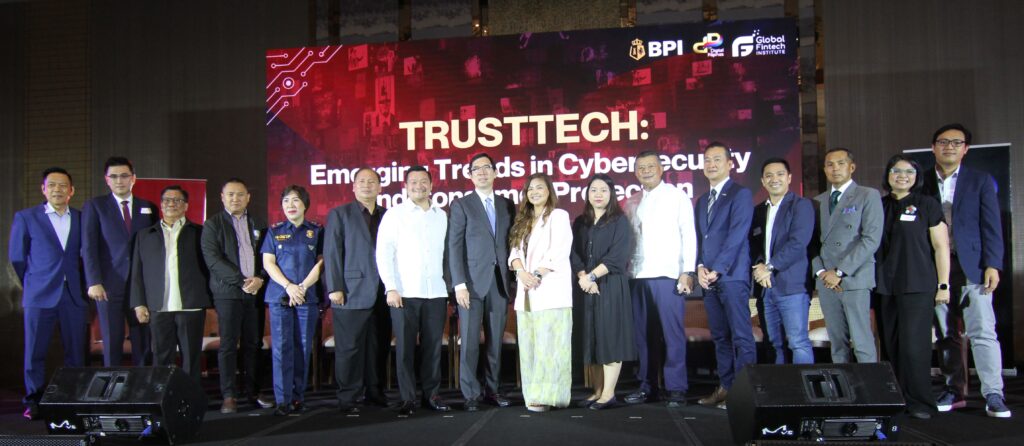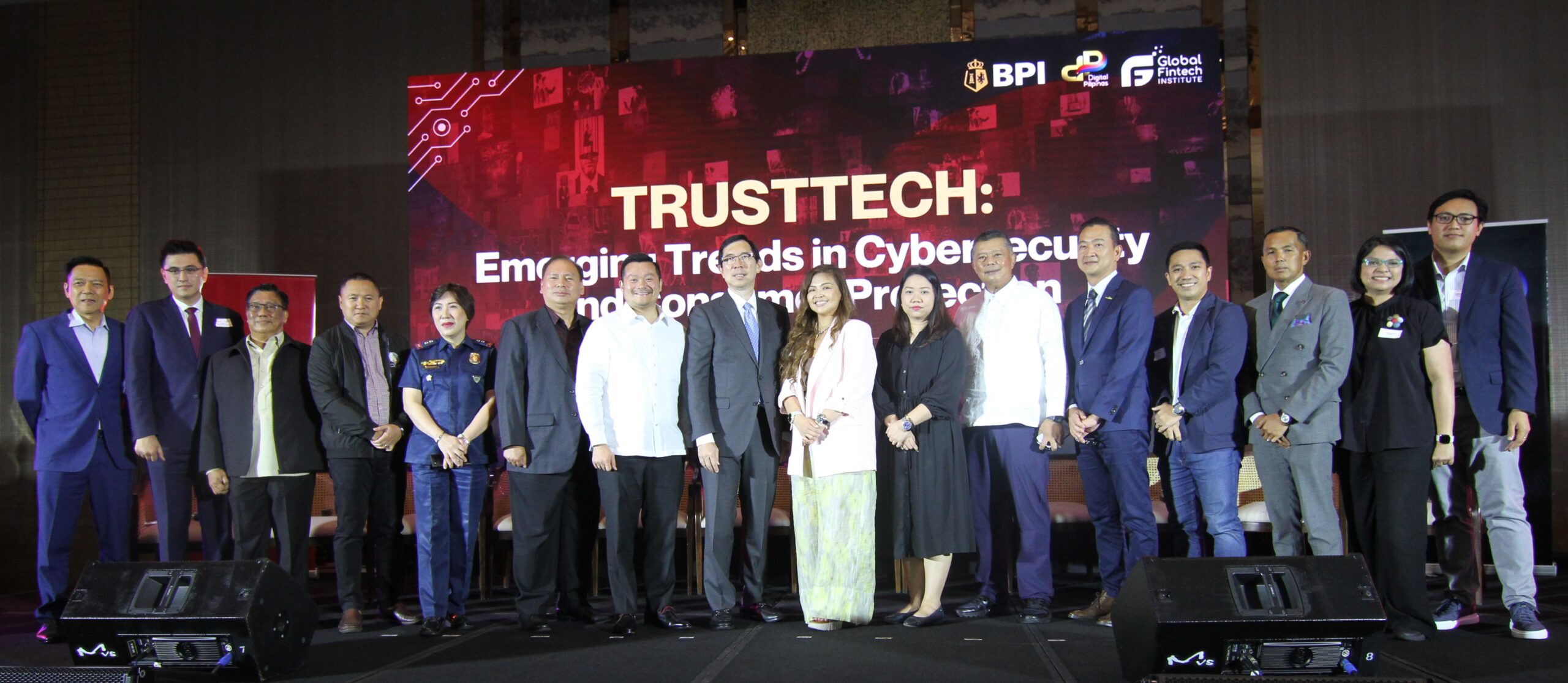Based on the latest update from the Cybercrime Investigation and Coordinating Center (CICC), more than 6,200 cybercrime cases have already hit several businesses in the country in the first half of this year alone. The report also states that in the last ten years, cybercrime incidents have continued to evolve, both in manner of commission and in the use of mechanisms, thus deterring police investigation.
To address this alarming surge in cybercrime incidents, which the PNP described as one of the greatest threats to the Filipino public, Digital Pilipinas and the Bank of Philippine Islands (BPI) recently launched the “TrustTech Movement” – a strategic, unified approach in combatting cybercrime.

Executives from Digital Pilipinas led by its convenor Amor Maclang (center) and TG Limcaoco (8th from left), president and CEO of BPI, are shown here together with representatives from the National Security Council, the National Privacy Commission, Information Security Officers Group, Global Fintech Institute, KPMG Philippines, PropTech Consortium of the Philippines, DICT, DOJ, Bangko Sentral ng Pilipinas, Gorriceta Africa Cauton & Saavedra, Coins.ph, Cybercrime Investigation and Coordinating Center (CICC), and the PNP– Anti-Cybercrime Group as they showcase the future of TrustTech with emerging trends in cybersecurity.
According to BPI, the TrustTech platform is a critical pillar for fostering positive and lasting relationships between consumers, regulators, legacy brands, startups, investors, and the academe in the tech industry. It will take on a whole-of-nation, a whole-of-business, and a whole-of-society approach to cybersecurity, bringing together the government and the private sector in close, biannual cooperation.
“At BPI, we recognize the importance of data privacy, not just as a legal obligation, but as a crucial component in building trust and fostering stronger relationships with our clients and stakeholders,” the president and CEO of the Ayala-led bank, TG Limcaoco, said in a LinkedIn post. “Upholding the right to privacy of our clients is imperative for any company aspiring to thrive and succeed in the information age, especially in an industry such as ours where trust is a currency that our businesses run on.”
Digital Pilipinas Convenor Amor Maclang, for her part, said, “In a space as agile as technology, trust has emerged as a critical pillar for fostering positive and lasting relationships. In response to the president’s thrust to curb money crimes, which he said is one of his priority legislations, the birth of TrustTech, and through capacity-building multilateral and cross-border partnerships and resource-sharing workstreams, we look forward to building a digital lifestyle that is safe for everyone.”
Maclang added that TrustTech is envisioned to “bring together the government and the private sector in close bi-annual cooperation through multiple smaller projects and sandboxes. “Because that’s how we do it in tech: we start small and win big,” she said.
Digital Pilipinas (DP) is currently the largest private-sector-led movement for creating an innovation and technology ecosystem in the country. Through its domestic and international trajectories, DP is actively pursuing its vision of a broadened digital economy that disseminates new technologies and provides abundant opportunities among small players.
In the upcoming Digital Pilipinas | Phillipine Fintech Festival 2023 to be held in Manila from November 21 to 24, TrustTech will be one of the many topics to be discussed. The event comes right on the heels of the Singapore Fintech Festival (September 12 to 13) and during the 2-day celebration of Philippine Startup Week (November 23 to 24).
The TrustTech Movement has since gained strong support from various government institutions such as the Department of Justice (DoJ), the Department of Information and Communications Technology (DICT), the National Privacy Commission (NPC), the National Security Council (NSC), and the Bangko Sentral ng Pilipinas (BSP), among many other institutions.
Cyber protection requires everyone’s engagement
During the launch of the TrustTech Movement, a collaborative effort between BPI and Digital Pilipinas, DOJ Secretary Jesus Crispin Remulla highlighted the importance of engaging every stakeholder, saying that cyber protection requires everyone’s attention. “Every one of us plays an equally crucial role in educating ourselves. Together, we foster a culture of digital resiliency and collaboration across sectors so we can ensure a safer online environment for our nation,” Remulla said in his keynote speech.
For his part, Atty. Leandro Angelo Aguirre, NPC Deputy Commissioner, reiterated that a digital lifestyle that is safe against cyberattacks will take “not just one company, one regulator, but a whole-of-nation approach that will bring everyone together, and give them all the tools necessary to provide that level of trust so people can take advantage of the benefits of what we can get from the internet.”
This was seconded by DICT Assistant Secretary Jeffrey Dy, who shared another pillar for online defense: “We want to increase the number of cybersecurity professionals. As part of government service, we’d like to include the portfolio of government professionals in cybersecurity.”
Collaboration with the public is also a prerequisite to cyber victory, starting with teaching them about the issue. According to Undersecretary Alexander Ramos of the DICT – Cybercrime Investigation and Coordinating Center, the solution does not just involve technology but a behavioral analysis. “We need to change the norms and practices of end users — and involve education as part of it,” he quipped.
Cong. Irwin Tieng, Chairperson of the House of Representatives Committee on Banks and Financial Intermediaries, then talked about the connection between consumer education, cyber protection, and nation-building, saying, “We need to educate the consumers about cyber scams, improve cybersecurity, and hold cybercriminals accountable. Only by preventing cyberattacks can we build consumer trust and ultimately, stimulate business and economic progress.”
Jovelyn Hao, Acting Deputy Director for BSP’s Fintech Innovation and Policy Research Group, added that digitalization, an objective of many national line agencies, cannot be achieved “if we forget about the cybersecurity component. If we want consumers to continuously use financial services, they need to be continuously trusting the system.”
TG Limcaoco, the president and CEO of BPI and also the president of the Bankers Association of the Philippines (BAP), said that TrustTech provides “an opportunity for us to reimagine the way we operate and interact in our digital ecosystems.”
“TrustTech requires a whole-of-nation approach, with both the public and the private sectors working together to safeguard financial systems, protect the public. and fortify our digital systems. By leveraging the latest technologies, embracing robust security measures, and prioritizing consumer protection, we can create an environment that instills trust, encourages innovation, and promotes sustainable growth,” he beamed. /JDP








